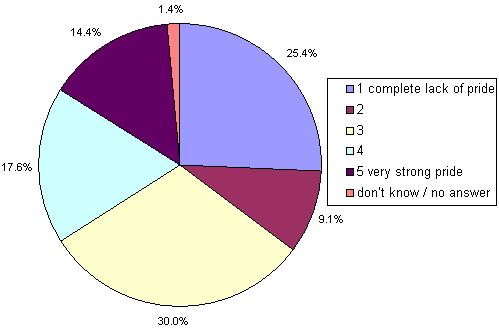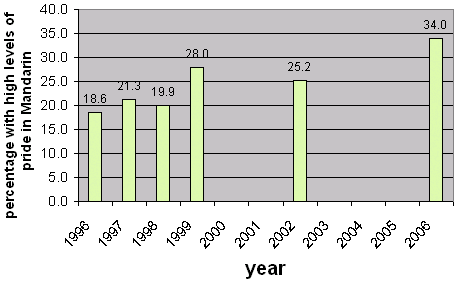Pride in the Mandarin language (Putonghua) in Hong Kong has risen from 18 percent in 1996 to 34 percent today, according to the results of a survey of survey conducted in October by the Chinese University of Hong Kong’s Center for Communications Research.
The center surveyed a total of 1,013 people about their feelings of pride associated with various Chinese things. A five-point scale was used to record the answers, with 1 representing a complete lack of feeling of pride and 5 representing an intense feeling of pride. (1 fēn dàibiǎo wánquán wú zìháo gǎnjué, 5 fēn dàibiǎo yǒu hǎo qiángliè jì zìháo gǎnjué / 1分代表完全無自豪感覺,5分代表有好強烈既自豪感覺).
Percentage of pride was calculated as the sum of the percentages of respondents giving 4 or 5 points when asked about their feeling of pride towards a certain icon.
Here is the breakdown for the recent survey question on Mandarin:

And here is how pride in Mandarin has changed over time:

Of course, if a response of 4 or 5 indicates pride, it may well be that 1 or 2 indicates a lack thereof, in which case those without pride in Mandarin (34.5%) still outnumber those with pride in it (34.0%).
Unfortunately, related questions on pride in Cantonese and English were not asked, so we don’t know how feelings about Mandarin stack up against those for the two other important languages of Hong Kong.
On the other hand, the survey covered other areas, which may be useful for purposes of comparison:
Almost half (48 per cent) of those questioned said they felt proud of the national flag and anthem of China compared to 30 and 39 per cent of those questions in a survey in 1996, one year before the former British colony became part of China again.
More than 28 per cent admitted pride in the China’s People’s Liberation Army compared to 10 per cent in 1996….
However, pride in Hong Kong remained higher with respondents grading their love for their home city at 7.52 on a scale of 1 to 10, compared to an average of 6.49 for China and only 2.91 for the Communist Party.
The Great Wall elicited some of the most positive feedback with 73 per cent saying it made them feel proud while the Chinese mainland security officials came out as being one of the most unpopular things in China, evoking pride in only 6 per cent of those questioned. (DPA)
I’d like to thank those at the Center for Communications Research for providing me with the data on Putonghua and answering various questions.
additional resource: Proud To Be Chinese – But Hongkongers Still Love Their City More, DPA, November 2006

Pingback: Week 4 - Following up on some leads « Nick’s JMSC6019 Blog
Pingback: Pinyin news » Attitudes in Hong Kong toward Mandarin: survey